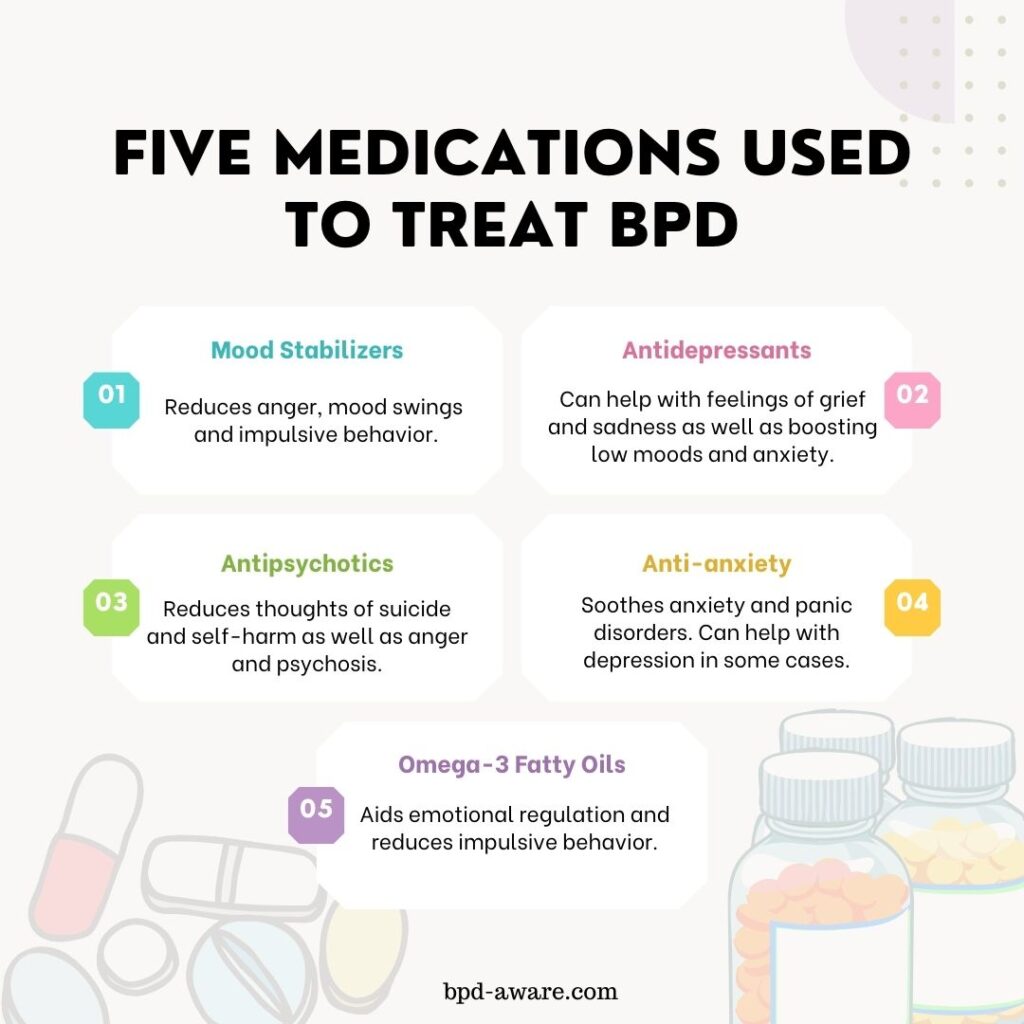If you’ve been diagnosed with Borderline Personality Disorder (BPD) – or know someone who has – you might be wondering what medications are used to treat BPD.
There are currently no medications designed specifically for the treatment of BPD that have been approved by the FDA. However, several different types of medication can help treat some of the symptoms associated with BPD, such as depression, anxiety, mood swings, and suicidal ideation.
The categories of medication used to treat BPD include:
(I’m only going to mention the generic names of the medications as the brand names can vary from country to country.)
Mood stabilizers/anticonvulsants
Mood stabilizing medications such as valproate, lamotrigine, lithium, and carbamazepine are often prescribed to people with BPD to help temper anger and reduce mood swings as well as impulsive behavior – both common symptoms of borderline personality disorder.
Around 36% of people being treated with BPD take a mood stabilizer.
Antidepressants
Antidepressants (including tetracyclic, tricyclic, MAOIs, and SSRIs) help to reduce the symptoms of depression and are one of the most commonly prescribed drugs in the world. They can help with grief, sadness, low mood, anxiety and irritability.
It may take a certain amount deal of trial and error to find the right antidepressant for the individual patient as each comes with its advantages and disadvantages.
Antipsychotics
The term “borderline” in borderline personality disorder refers to the belief that patients with the disorder are on the border between psychotic and neurotic.
Antipsychotics like loxapine, haloperidol, and flupenthixol depot can help reduce some of the psychotic elements of BPD such as suicidal ideation, self-injurious behavior, anger, and psychosis.
While antipsychotics can be helpful to some, they can make symptoms of BPD worse and need to be closely monitored by a mental health professional.
Anti-anxiety
Anti-anxiety drugs work by increasing the amount of GABA in your system. GABA is a chemical made in the brain that produces a calm, soothing effect. Major depression has been linked to abnormal GABA activity.
Drugs such as diazepam, alprazolam, lorazepam, and clonazepam are all used to reduce anxiety and panic disorders and can be used successfully to help people with BPD.
Health supplements
There’s growing evidence that Omega-3 can improve symptoms of borderline personality disorder, particularly impulsive behavior and emotional dysregulation.
Omega-3 supplements can be purchased in grocery stores, pharmacies, and online. You can also up your Omega-3 levels by eating oily fish like mackerel, herrings, sardines, and salmon. Walnuts, soybeans, flaxseed, and chia seeds are other great sources of Omega-3.
Taking a Vitamin D supplement can also be hugely beneficial. Roughly 50% of the population is deficient in Vitamin D, which has been linked to depression, anxiety, and mood disorders.

Can I just take medication without therapy?
It’s not advised to try and treat borderline personality disorder only by using medication as there is no cure-all pill available. While medication can reduce certain symptoms, it won’t lead to a full recovery on its own. It should be used to support the patient while they work on learning coping skills and improving their emotional regulation in a therapeutic setting.
Evidence doesn’t support medication as the sole line of treatment for borderline personality disorder at this time.
BPD medication questions and answers
My psychiatrist has prescribed me three different types of drugs to treat my BPD, along with undergoing therapy. Is this normal?
While most people with BPD typically take one or two medications to help with their condition, three or more is not uncommon and not something to be concerned about unless you struggle to remember to take them all or you feel they’re having an adverse effect.
I forgot to take my pill today, what should I do?
Generally speaking, you should be okay if you forget to take medication for a day but it’s always best to check with your healthcare provider or pharmacy as they can provide advice specific to your medication.
I don’t want to take medication as I’m worried it’ll change who I am. Is it okay not to take any?
If you’ve been prescribed medication then it’s because your psychiatrist believes it’s in your best interest to take it. If you strongly feel that you don’t want to take medication then you should make this clear to them and see where you go from there.
If you’ve not been prescribed anything and are just beginning your BPD journey then you might not need to take any form of medication. Therapy should always be the first port of call for anyone with borderline personality disorder.
What’s the best medication for someone with BPD?
There’s no one-size-fits-all approach when it comes to medication and borderline personality disorder so it’s impossible to crown one as the best. It depends on the severity of your symptoms as well as the nature of those symptoms.
Some people respond very well to medication and others don’t.
Final Thoughts
There are many kinds of medications that can be used to treat some of the symptoms of borderline personality disorder. Finding the right drugs or combination of drugs can take a lot of time and trial and error.
Medication shouldn’t be seen as a cure for BPD or as a replacement for undergoing therapy such as Dialectical Behavioral Therapy or Schema Therapy. But it can provide relief for some people.
If you have any questions about medication and borderline personality disorder, please leave us a comment below and we’ll be sure to answer you.
Sources, Resources, and Further Reading
- Types of Medication for BPD: https://www.verywellmind.com/borderline-personality-disorder-medications-425450
- Pharmacological Management of Borderline Personality Disorder and Common Comorbidities: https://pmc.ncbi.nlm.nih.gov/articles/PMC10276775/
- Treating Borderline Personality Disorder Without Drugs: https://www.hopeforbpd.com/borderline-personality-disorder-treatment/treating-borderline-personality-disorder-without-drugs
















